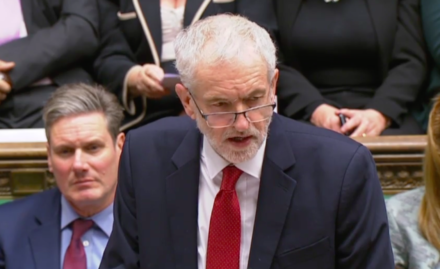
This afternoon, Labour briefed to journalists that the party would table a motion of censure against the Prime Minister if she did not confirm the date of the meaningful vote on her Brexit deal. It was duly reported in the lead-up to Theresa May’s latest Brexit statement that Jeremy Corbyn would threaten a vote of no confidence in the Prime Minister in his response.
Corbyn was expected to say: “If the Prime Minister does not announce the date for the final vote immediately and with the vote taken promptly, I will table a motion; That this House has no confidence in the Prime Minister due to her failure to allow the House of Commons to have a meaningful vote straight away on the withdrawal agreement and framework for the future relationship between the UK and the EU.” (This is not the same as, and does not hold equal weight to, a motion of no confidence in the government, which could actually topple May. It only tests the waters and serves to embarrass.)
But the Labour leader shelved the warning because May did include a date in her statement, confirming that the vote would be held the week commencing 14th January. Corbyn’s threat withdrawal confused and irritated lobby hacks, who had already written up the news story. But putting aside the fact that ‘week commencing the 14th’ is hardly different to the already-promised deadline of ‘before the 21st’, there is a simple explanation for the shifting sands.
Although the opposition leader receives an advanced copy of the Prime Minister’s statement, this was only offered 30 minutes beforehand (at 3pm, ahead of the statement being delivered at 3.30pm). The copy included May’s date ‘reveal’, but the Labour leader’s office had already briefed the decision to announce a no-confidence vote in the PM to the press by that point.
Did Labour force the government to bring her deal to parliament, as it has now claimed? Well, No10 says May was “always going to” mention the date in her statement. And, as noted above, the mid-January date had already been reported by various outlets, not to mention basically confirmed with a self-imposed 21st January deadline. In any case, Labour hopes it has successfully communicated to the public that it is exerting pressure on the government.
Update, 6.30pm:
Jeremy Corbyn has now asked the Speaker to table a motion of no confidence in Theresa May. Speaker Bercow did not respond. It is up to the government whether it allows parliamentary time for Labour’s motion. If Labour’s demand for time isn’t met, the opposition party could bring forward a motion of no confidence in the government, which is more serious as it could lead to a general election under the Fixed-Term Parliaments Act.




More from LabourList
‘Labour won’t stop the far right by changing leaders — only by proving what the left can deliver’
‘Cutting Welsh university funding would be economic vandalism, not reform’
Sadiq Khan signals he will stand for a fourth term as London Mayor